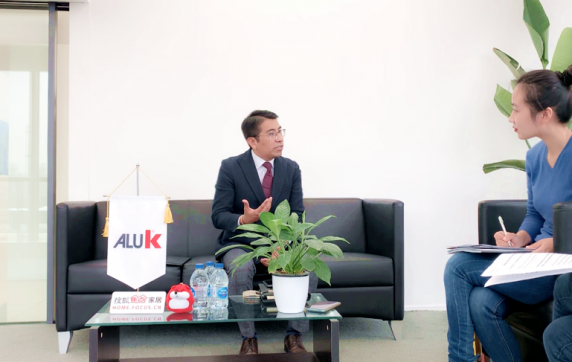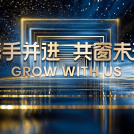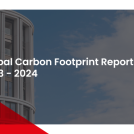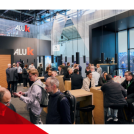China has been the country with the biggest window and door market in the world. Many international brands are doing great job here in China, with a lot of outstanding projects. How they set their standards in this diverse market? What will they do in front of the challenges?
With all these questions, Mr. Andrea De Gaspari, Managing Director of AluK China received the interview from Sohu Focus recently.

Q1: AluK was founded in 1949. What has the brand gone through over the past half century? How do you develop the international market?
The coverage: Now the Group has a strong presence across Europe, Asia and the Middle East. Besides AluK Italy, now we also have AluK France, AluK UK, AluK Belgium, AluK Netherland, AluK MiddleEast, AluK China, AluK India and AluK South East Asia. And also one exclusive distributor in Australia to cover the Australian market.
Efficient process and global facilities: Westore and finish our building systems locally, with in-house processes ensuring we provide an efficient and reliable service. Product auto-picking allows us to source and select our systems quickly from any of our ten warehouses, while our painting facilities are some of the most advanced in Europe, offering thousands of colours and dual colour options.
Q2: There are many successful cases of AluK in China. For example, the Beijing Hotel in 1985, the Tomson Riviera, Star River, Atlantis Sanya and other excellent projects. What’s your business model in the market?
First is our partnership with fabricators. We cooperate with local partners to develop the market together, by offering them system training, solution and strong local technical support.
Another part is our strategic cooperation with developers. It has been 35 years since our first project launched in China in 1985. By years of local practice in China, we’ve also set up strategic cooperation with some key developers. Millions of AluK products are used all over the country and meet the highest requirements of design, comfort, security and energy efficiency.
Q3: “System” involves a lot of investment such as design, R&D and certification, etc. to make sure of the excellent performance. It must require more margin in pricing to keep it sustainable. Higher performance means higher cost. In the dynamic Chinese home deco market, what kind of impact will material cost, customer behavior, or profit model have on you?
Yes, we invest heavily in research and development every year, helping us to deliver advanced aluminium building systems to meet the needs of developers, architects, and end-users. All of our aluminium building systems are meticulously tested in our own 3rd party accredited facilities, where they are assessed on a range of performance criteria including water, wind, airtightness, durability, thermal insulation and acoustic insulation.
For the impact of material cost and profit model, no matter how it changes in the dynamic market, we will always focus on the system development in terms of design, functionality, performance. And make sure of the premium quality.
Talking about the impact of customer behavior, nowadays people are willing to pay for great products, especially system windows which canoffer excellent thermal & acoustic performance, for comfort living environment. It might be a challenge for other normal window & doors players, but it’s definitely a potential market for AluK.
Q4: The real estate market has been in the seller's market for a long time. The concept of green building is not so popular. People pay more attention to the quality rather than performance. System windows & doors are normally with higher price, which makes it difficult to be adopted by profit-seeking real estate companies. How should AluK face the Chinese real estate market? How to balance the relationship between price and performance?
Not all the developers are profit seeking. We have cooperated with developers who really want to offer the best product to end-users. And we are proud to have the chance to participate in those projects.
Through accredited testing facilities and in-house research and development, we ensure our products offer high performance solutions and exceed many industry standards. We have a wide range of system windows and doors with different positioning. Customers may choose what they want based on their needs & budget.
Q5: As upstream industry chain, real estate has a great impact on the home deco market in the middle and lower reaches in recent years. Especially the rise of prefabricated buildings. What are the requirements for system windows and doors? How does AluK face this challenge?
With the development of the real estate industry all these years, and also together with the macro economic control by the government, the whole industry is getting more integrated, optimized and standardized. Meanwhile, energy saving and sustainable development has becoming a key concern of the whole society. Along with all the above big environment, prefabricated building rises. It realizes product standardization in project market, which increases efficiency and lowers cost to a certain extent, also complies with the green development.
For system windows and doors, it requires more in terms of standardization and efficiency. We need products with full range, and factories for large-scale production. Related informationization enables us to search, trace and monitor.
As an international system brand, AluK has rich experience in prefabricated buildings in Europe. Actually, in China, we’ve already participated in some projects of prefabricated buildings 10 years ago, with Vanke, for example.
We are willing to contribute ourselves in the development of prefabricated buildings in China and promote our advanced systems to the market. For example, our KA series. The system uses the new range of accessories, characterized by the simplicity and speed of production achieved thanks to a small number of components and assembly steps. 3D adjustments in all axes, cams and arms are also completely adjustable, which means allowing compression in high, lateral and height, even after installation.
Q6: Have you got factories here in China? Do you have the certificate to produce products with environment friendly? Does the company pay attention to sustainable development?
Actually, we have a warehouse in China. For the products coming from Europe, the delivery time is too long. With a distribution center here in China, we can do simple packing and shorten the lead time of each order.
The construction industry accounts for 40% of energy consumption and CO² emissions. For that reason, there are lots of opportunities to become more efficient and innovative. As the product itself, aluminium is famously sustainable, with excellent recycling properties. It can be continuously recycled without losing its benefits and, additionally, it is a low-maintenance material, requiring modest care to keepit in top condition.
Avec REVIVE®, Aluk transforme les bouteilles PET en produits durables en aluminium. Le Groupe AluK est leader mondial dans la conception et la fabrication de systèmes de fenêtres, portes et portes coulissantes en aluminium. Pouvant nous targuer de plus de 70 ans d’expérience, nos systèmes de construction satisfont aux exigences techniques complexes. Nous possédons toujours une longueur d’avance sur le marché. REVIVE® nous permet donc de donner une seconde vie à une grande quantité de plastique. Nous exerçons par conséquent un impact non négligeable sur la durabilité de notre planète.
Through research activity, AluK aims to deliver products offering the best combination between performance and comfort while increasing energy savings and reducing CO² emissions. In its own operations AluK is also taking a number of initiatives contributing to a more sustainable world. For example, AluK invested in electrical cars, installed a PV solar farm to feed AluK factory in France. AluK is currently busy with its digital transformation. This project should enable AluK to reduce paper use and related raw material andenergy consumption while improving its interaction with customers.



